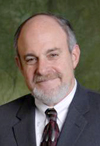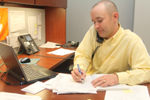|
By Cindy
Abole
Public Relations
Moving research
discoveries to market and guiding
MUSC's relationships with industry
to bring an integrated approach to
business is the goal of Lawrence
(Larry) Olanoff.
 Olanoff, M.D., Ph.D.,
arrived in June as special advisor
to MUSC President Ray Greenberg,
M.D., Ph.D., for corporate
relations. Olanoff, M.D., Ph.D.,
arrived in June as special advisor
to MUSC President Ray Greenberg,
M.D., Ph.D., for corporate
relations.
Not a stranger
to MUSC's campus, Olanoff will
lead the campus' research
community in identifying and
cultivating industry sponsorships.
Specifically, he will help
accelerate the transfer of new
medical technologies,
pharmaceuticals, therapies and
research advances that will
improve health care, generate
revenue and increase MUSC's
presence in this area.
His view of
MUSC has changed since the early
1980s when he first worked as a
medical intern in the Department
of Internal Medicine and later, as
a clinical pharmacology fellow in
MUSC's Division of Clinical
Pharmacology under Perry V.
Halushka, M.D., Ph.D., now College
of Graduate Studies dean. He's
impressed with how MUSC's breadth
of scope has strengthened to
include a greater quantity of
basic and clinical research
projects and clinical practice
capabilities such as at the
Hollings Cancer Center (HCC). In
March 2009, HCC became the 64th
National Cancer
Institute-designated center — the
only facility of its kind in South
Carolina. Most recently, Olanoff
worked as a member of MUSC's
Foundation for Research
Development's (FRD) board until
his retirement in 2010 as former
president and chief operating
officer at Forest Laboratories
Inc. in New York.
Greenberg and
other campus leaders are impressed
with Olanoff's leadership in the
pharmaceutical industry and
service on the FRD board.
"Dr.
Olanoff is the perfect person to
help connect us strategically to
industry partners. He
understands the intellectual
resources on this campus and he
also has a keen awareness of the
needs of the private sector. As
the Drug Discovery and
Bioengineering buildings open,
and we have a push to expand our
technology transfer, Dr. Olanoff
can play a key role in these
efforts," Greenberg said.
Returning
to the Lowcountry, Olanoff is
impressed with how MUSC's campus
has evolved to become both
collaborative and focused on
advancements in translational
medicine. He credits this in
part to a 2009 $20 million
Clinical Translational Science
Award from the National
Institutes of Health (NIH),
establishing the South Carolina
Clinical and Translational
Research Institute (SCTR)
Office, making new treatments
available, expanding clinical
research efforts and preparing a
new generation of researchers.
In more
recent years, pharmaceutical
companies scaled back their own
testing, developing targets for
drugs and other basic science
efforts only to turn to
institutions such as MUSC to
conduct this research, and
develop new discoveries.
According
to Olanoff, industry sponsors
typically follow where the
research is located and most
often these are the most
commercial markets.
Pharmaceutical giants such as
Novartis has established a
biomedical research institute in
Boston, collaborating with
Harvard University and
surrounding research
institutions to help advance and
market discoveries.
Halushka
said Olanoff has incredible
perspective about what
pharmaceutical companies are
looking for when they partner
with academia. "As a growing
research institution, his
expertise will help guide us to
partner with pharmaceutical
industries and become more
entrepreneurial. He's a real
asset to our campus."
In the
past few months, Olanoff has
been meeting and visiting with
faculty and observing the
institution's collaborative
environment. He's also
identifying researchers who have
potential intellectual property
and promising discoveries. At
the same time, Olanoff is
approaching corporate sponsors
to link their research goals
with MUSC's long-term research
interests. To emphasize this,
he's aligning these goals with
two of the MUSC Strategic Plan's
core themes — entrepreneurship
and technology/innovation — to
inspire efforts and help others
visualize how discoveries can
progress to product development.
"Establishing
these types of relationships
benefits both the industry
sponsor and the institution.
It's about taking existing
relationships and making sure
they are optimized as much as
possible," said Olanoff, who is
anxious to partner with
commercial developers, companies
and investors interested in
developing long-term
relationships with MUSC
researchers. Aside from working
with pharmaceutical companies,
he'd also like to partner with
large medical device
manufacturers and
diagnostic-related companies.
"We're
hopeful that Dr. Olanoff can
match MUSC's abilities and skill
sets with companies that will be
complementary. I see this as his
greatest talent," Halushka said.
Olanoff
is already working with
on-campus resources like the
Office of Industry Partnerships'
Stuart Knight and the SCTR
Office on projects. Olanoff is a
member of the SCTR triage team,
a group which meets regularly to
evaluate SCTR-funded projects
and researchers who possess
research data and valid
applications that may be
patentable or licensable.
Olanoff
also works closely with FRD
director
Chip Hood, J.D., and his team to
carefully evaluate each product
to determine its efficacy and
scientific credibility and to
confirm if there are any future
commercial applications for this
product.
Hood said
they've developed a plan and are
moving forward with it at a good
pace. "Dr. Greenberg's vision
for MUSC to begin
commercializing new technologies
and inventions needed someone
experienced in developing
strategic relationships with
industry. Dr. Olanoff helps
bridge that gap between the
academic researcher and industry
business development person in
creating cutting edge
technologies and products that
can make a difference," he said.
Olanoff
agrees that MUSC's campus is
ripe for this transition.
"There's
an enormous amount of high
quality and useful research
that's going on at MUSC," said
Olanoff, whose niche is getting
sponsorship and establishing a
flow of industry funds to
support the research at a very
early stage. "What I'm doing is
building on something that's
already established and helping
our institution market
capabilities that will bring
early-stage research funding,"
he said.
For
information, visit
MUSC'sFoundation for Research
Development, http://academicdepartments.musc.edu/frd/contact.htm.
Technology officer dedicated to
researchers, new discoveries
By the time
microbiologist David Holman had
earned his doctorate from MUSC's
College of Graduate Studies, his
attention was focused on science
and the thrill of discovery. Six
years later with some biotech
experience under his belt, his
interests have shifted to helping
others with their own research
inventions and materials and the
institution's policies for
managing intellectual property.
Holman wanted to be part of a work
environment that fosters discovery
and innovation.
 Foundation for
Research Development's Dr. David
Holman consults with a colleague
regarding the licensing process
of a research discovery.
Holman's office is in the newly
relocated College of Graduate
Studies offices in the
Bioengineering Building. Foundation for
Research Development's Dr. David
Holman consults with a colleague
regarding the licensing process
of a research discovery.
Holman's office is in the newly
relocated College of Graduate
Studies offices in the
Bioengineering Building.
In his new
role, Holman manages the
technology transfer of new science
and clinical discoveries. He
provides guidance to researchers
about the technology transfer
process working primarily with
faculty, clinicians and students
to help them understand patents,
copyrights, and licensing in the
context of academic research. More
specifically, he's involved in the
evaluation, marketing and
licensing process of inventors'
intellectual property. Holman will
develop and execute invention
management strategies, facilitate
non-disclosure agreements for
campus inventions, and manage
licensing agreements and secure
intellectual property protection
(i.e. patent applications) for
inventions.
The York
native earned his doctorate in
microbiology in 2005 from the
College of Graduate Studies. He
worked for a Mount Pleasant
biotech start up company before
returning to his alma mater to
work in the Foundation for
Research. Holman is a registered
patent agent and is finishing
his law degree as a part-time
student of the Charleston School
of Law. He will graduate next
May.
"We want
our researchers to benefit from
their work and enjoy the many
benefits beyond just making the
research dollars," he said.
South
Carolina Clinical and
Translational Research Institute
(SCTR) co-principal investigator
Perry Halushka, M.D., Ph.D., is
proud to have one of his
college's alumni return to
campus. "David's done a
phenomenal job in such a short
period of time. He has created
greater visibility for SCTR and
FRD and has generated lots of
good will with his colleagues
through his position. He's
focused on improving
communications and response time
to the research community."
For
information, email
holmad@musc.edu.
|



 Olanoff, M.D., Ph.D.,
arrived in June as special advisor
to MUSC President Ray Greenberg,
M.D., Ph.D., for corporate
relations.
Olanoff, M.D., Ph.D.,
arrived in June as special advisor
to MUSC President Ray Greenberg,
M.D., Ph.D., for corporate
relations. Foundation for
Research Development's Dr. David
Holman consults with a colleague
regarding the licensing process
of a research discovery.
Holman's office is in the newly
relocated College of Graduate
Studies offices in the
Bioengineering Building.
Foundation for
Research Development's Dr. David
Holman consults with a colleague
regarding the licensing process
of a research discovery.
Holman's office is in the newly
relocated College of Graduate
Studies offices in the
Bioengineering Building.